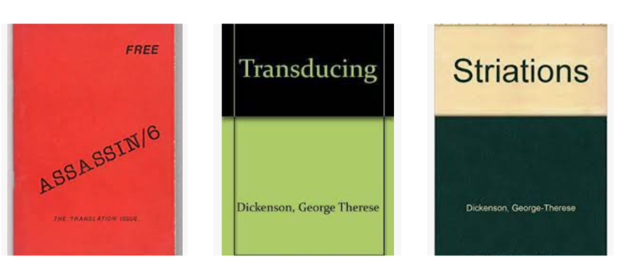
George-Thérèse Dickenson (1951–2021)
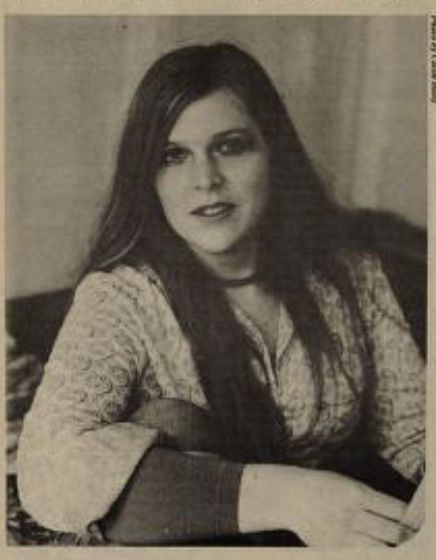
Poet, editor, and activist George-Thérèse Dickenson died June 15, 2021 in New York. The cause was a brain hemorrhage, according to her brother, John Dickenson.
With Will Bennett, Dickenson edited the magazine Assassin in the late 1970s.
She published two books:
Striations, from Good Gay Poets (Boston, 1976)
Transducing, from Segue (New York, 1986)
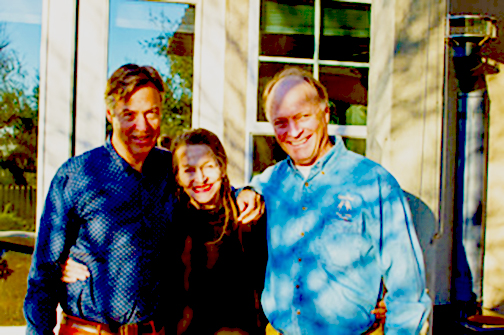 George-Thérèse Dickenson was born October 23, 1951, in Napa, CA, daugher of Howard George Dickinson, a lawyer, and Joanne DePuy (maiden name Cardiff), a wine and travel entrepreneur from Altadena, CA. Dickenson was a graduate of Wellesley College. After a brief stint at UC-Berkeley, she moved to Vermont and then Boston in the early 1970s, where she became involved with the anarchist circle around Murray Bookchin. She also connected with a group of poets. In the late 1970s, she moved to lower Manhattan, where, over the next decade, Dickenson was closely involved with Larry Estridge and Peter Seaton. During that time, she taught poetry in the prisons through Janine Pommy Vega’s Incisions Arts Project. Her poems were included in a related anthology, Candles Burn in Memory Town: Poems from Both Sides of the Wall, edited by Vega (Segue/Incisions, 1988). While in New York, she struggled with substance abuse. During Dickenson's last decades, she was living in a mountaintop cabin in a nudist colony in Stockton, NJ. She is survived by her mother and her brothers John and Chuck (pictures above) and her longtime partner Bobby Astarita.
George-Thérèse Dickenson was born October 23, 1951, in Napa, CA, daugher of Howard George Dickinson, a lawyer, and Joanne DePuy (maiden name Cardiff), a wine and travel entrepreneur from Altadena, CA. Dickenson was a graduate of Wellesley College. After a brief stint at UC-Berkeley, she moved to Vermont and then Boston in the early 1970s, where she became involved with the anarchist circle around Murray Bookchin. She also connected with a group of poets. In the late 1970s, she moved to lower Manhattan, where, over the next decade, Dickenson was closely involved with Larry Estridge and Peter Seaton. During that time, she taught poetry in the prisons through Janine Pommy Vega’s Incisions Arts Project. Her poems were included in a related anthology, Candles Burn in Memory Town: Poems from Both Sides of the Wall, edited by Vega (Segue/Incisions, 1988). While in New York, she struggled with substance abuse. During Dickenson's last decades, she was living in a mountaintop cabin in a nudist colony in Stockton, NJ. She is survived by her mother and her brothers John and Chuck (pictures above) and her longtime partner Bobby Astarita.
Recollections of George, compiled by Will Lashley
Will Lashley (London, July 2021): “George-Thérèse Dickenson was a complex being of more than one incarnation. We first met at the Fresh Ground Coffee House on Church Street in Burlington, Vermont. She arrived in Burlington during the summer of 1972 from California with another California native working at the Fresh Ground, her friend Anna Blackmer (the teacher and poet, author of “Hexagrams”), after they dropped out of UC Berkeley.”
Anna Blackmer (Burlington, July 2021): “She grew up in Napa. She was a descendant of Gallant Duncan Dickenson, who came to California with the Donner Party, but decided not to stop and made it through -- going on to become wealthy and a judge.”
Will Lashley: “The utopian social ecologist Murray Bookchin and his wife Bea often held court at the Fresh Ground, along with the Liberty Union Party fixtures like Michael Parenti, Peter Diamondstone and Bernie Sanders (who would later split with the Party and run for Mayor). Murray and Bea’s daughter Debbie was very close to George in those days. She’s now the keeper of her father’s legacy and an author and activist in her own right as a proponent of the Rojava resistance and the municipalist movement.”
Debbie Bookchin (Albany, July 2021): “My most vivid memories of George are really from Berkeley where I met her when I was 15. She followed me and Anna Blackmer back to Burlington two years later, and that's how she became involved in Fresh Ground and the Burlington scene. George was always trying (and ultimately succeeding) to navigate that Napa Valley WASPy thing that her family seemed intent on trying to impose on her. I remember that she had a terribly toxic relationship with her mother for a long time, and I always found it sort of hilarious that she lived in a Sorority House at Berkeley, yet hung out with us anarchists on Parker Street.”
Will Lashley: “The composer Andrew Nadelson worked at Fresh Ground too. He was a young gay activist who had been arrested with Julian Beck and Judith Malina of the Living Theater in Brazil in July of 1971. They had been living a nomadic life for years, presenting “street theater” in schools, factories, hospitals, and outside of prisons, seeking ways to connect directly with industrial workers and common people in non-theatrical spaces in Italy and Germany. When the Living went to the Ouro Preto, a mining town in the eastern mountains of Brazil, they were imprisoned for two months on charges of possessing “contraband” (marijuana, Andrew swore they were set up) and “sedition” (guilty as charged). After they were deported back to the U.S., they found it hard to survive in New York without a working venue and were considering moving the theater troupe to Vermont. George was enthralled with them. She was absorbing Artaud, and her modus operandi was confrontation. But Burlington was not Rome, and the Living returned to Brooklyn.”
Anna Blackmer: “Some of the Living Theater people were up here, staying at a house in Richmond where Jane Kramer and Roz Payne lived. I also remember that George joined a women's theater group, called the Unity Players, that summer.”
Will Lashley: “By 1973, George was a leather booted and plaid workshirt-wearing lesbian in search of radical transformative experiences. She was very involved with the gay and lesbian lifestyle, working through collective visions of radical feminism, and was part of the consciousness raising and women’s liberation meetings taking place there. She became increasingly active in Burlington’s poetry scene, that coalesced around the Poets Mimeo Press, edited and published by the expansive poet Tinker Greene, who organised readings at the old firehouse (and published the magazine Firehouse). The sorority sister was long gone, replaced by an ardent anarchist and “poetic provocateur” whose blend of political critique and erotic empowerment became an enduring strain in her work.”
Tinker Greene (Chicago, July 2021): “We first met George in Burlington Vermont in the seventies. I say "we" because there was a group of poets active there and George joined with us. She had come to Vermont to continue to be near the anarchist thinker Murray Bookchin, and several of those in Murray's circle eventually became involved with our literary community. George was a vivid being and an indelible poet; and in my experience anyway, impossible not to love.”
Anna Blackmer: “I think she moved to Boston in 74 -- and I do remember well that she studied at Wellesley with Frank Bidart -- she spoke of him often, of what a great teacher he was.”
Will Lashley: “I left Burlington in the fall of 1973 to attend college and reacquainted myself with George during the “impeachment summer” of 1974, when I moved to Cambridge, MA. George had become involved with the group of poets doing readings and publishing chapbooks at the Stone Soup Gallery. Jack Powers was holding weekly Monday night readings there on Cambridge Street, in the shadow of Massachusetts General Hospital. We were a disparate bunch of poets: a core group of “old timers” who had followed Jack Powers through various venues, working class gay men taking the train in from Dorchester, a Mass General registered nurse stopping in before she took the Red Line back to Medford, academes trying their hand as a break from studying for their thesis, a draft dodger living under an assumed name, a gay Vietnam vet turned anti-war activist, self promoting leather clad punks on the prowl for recognition, “performance” and “language” poets honing their craft, and fellow souls emboldened by our little community of aspiring belletrists. But George stood out amongst us -- “the cynosure of neighbouring eyes.” She had some stiff competition, like her roommate Rando, a six foot two Floridian who wore three-inch platform shoes and had bright orange hair down to the small of his back. Mascara and eye shadow deepened the impenetrable hauteur in his green-eyed gaze, staring down poetasters whose confessional earnestness made him wince. Fond of double entendres, witty if sometimes glib, he shared the flat with George and another poet Will Bennett on the north “seedy” side of Beacon Hill. It was drafty and dishevelled, and Will’s glass shard sculptures were a hazard when we turned up David Bowie loud and danced. That happened nearly every night, but I think it was there that she really began to find herself as a poet. She was reading voraciously, experimenting with hieratic and oratorical voices, bearing down hard and paring her diction. Her personae took on a much deeper presence, and she corresponded with poets from afar and read her poetry not just around Boston but branched out to other cities. She and Will Bennett edited and published the magazine Assassin that had a run of a half dozen or more issues, and she published her first book, Striations, with the Good Gay Poets press.”
Tinker Greene: “Off and on she would be living in Boston --she sometimes worked as a stripper in Boston's so called "combat zone"-- so in those years she and Will became an important contact point between Burlington and one of its closest major cities (the other being Montreal).”
Will Lashley: “She was attending Wellesley College and studying for her masters in literature by day while working nights as an exotic dancer at the Normandy strip club in the Combat Zone (the Washington Street area adjacent to Chinatown in Boston). It was an edgy choice, but George was very much at home in that somewhat insular subculture of punk rockers and lesbians who made up the bulk of her fellow dancers. The dancers were at the top of a pyramid that sloped downward through the bartenders and waitresses hustling tips at the bar, descending to a demimonde doing “dirty mixing” and fleecing the fetishists in the backrooms, and other even coarser sex workers turning tricks in the alleys off LaGrange Street. Most of the dancers like George foreswore all that “wrinkle business” and rough trade, but they enjoyed the ambiguities of their “double lives” as women empowering themselves in defiance of the stereotypical opprobrium and condescension that the “straights” felt for them. George became good friends with some very exotic characters indeed, such as her friend Mattie, a lesbian Normandy dancer who worked the carny circuit strip shows in the summer months, and the popular “thinking man’s stripper” Princess Cheyenne (Lucy Wrightman) who danced at The Naked I. Not that George looked down on the prostitutes: She followed Margo St. James and the whole PUMA/COYOTE unionisation of sex work closely in those days. George used all that experience as well in her writing. It just sharpened her anarcho-feminist dialectics, and she published some great poems in the short-lived but seminal periodical Black Rose, a Journal of Contemporary Anarchism, alongside authors including Murray Bookchin, Noam Chomsky, Marian Leighton, John Hess and Raoul Vaneigem.”
Anna Blackmer: “Fred Toguchi and I moved to Boston in the summer of 76, and George was gone to NY soon after, living on 2nd Ave I believe, around the corner from the Men's Shelter. When I drove Will Bennett there sometime in 77, he'd also decided to decamp to NY from boring Boston, I only remember stepping over an unconscious man lying across the threshold, moaning. I was carrying my three-year old, Misa. George was very immersed in the poetry scene on the Lower East Side, but that's really when we kind of lost touch.”
Will Lashley: “After she left Boston, she and then boyfriend Larry Estridge edited some punk 'zines, but I can't recall the names of any of them. I moved to Manhattan in the fall of 1980, and hung out with her some while she was still living with Larry and afterwards, but by that point our lives were taking on very different trajectories. Around 1987, George and Larry also landed day job gigs as editors for the glossy weekly New York Magazine (if I recall, George was eking out a living in those times proof reading and indexing for various publishers), but I don't know how long that lasted. I have lost track of most of our mutual friends from that time. Some died of AIDs, others just aged and moved on, but George was the brightest star among them. She was smart, voluble, lovable, funny, always intriguing and always generous, warm-hearted, occasionally outrageous or ridiculous in very amusing ways, even if conflicted or obsessed at times with recently taken up enthusiasms. Just a big, bold character. At her best, she lived exquisitely in the present. I really loved her. Her spark, passion and conviction will be celebrated by all who knew her, even as we mourn our loss.”
Debbie Bookchin: “She deserves to be remembered as a magnificent, vibrant, loving, and true-hearted friend, who cared little about material things, and whose engagement with imagination was ultimately about finding beauty in life.”
Nathaniel Otting: "Everybody died but George-Thérèse Dickenson didn’t. She survived that slippery business, and lives in a cabin in Sparta, New Jersey (splitting time in New York: not Troy). I didn’t know that when I decided to call this New Jersey Work “The Helens of Sparta.” I didn’t know she was alive when I called the number I got from her website (she’s a ghostwriter). Happily, she answered and laughed when I gasped and was delighted to hear of a revival of interest in Peter Seaton’s writing. And her own. It seems younger writers have been tracking her down recently. Like Seaton, she continued to write without seeking publication or giving readings. A trilogy of book-length works is nearly complete. She sent me a few pages from the third book. It’s tremendous writing, not surprising at all as her two published books are marvelous.” (Poetry Project Newsletter, April/May 2013)
••••••••
PennSound has four recordings from the Ear Inn / Segue Series:
At the Ear Inn (Segue Series)
Dec. 15, 1984 (31:35): MP3
May 24, 1986 (34:16): MP3
Jan. 23, 1988 (14:58): MP3
At Zinc Bar, NYC (Segue Series)
May 23, 2105 (31:56): MP3
from Striations:
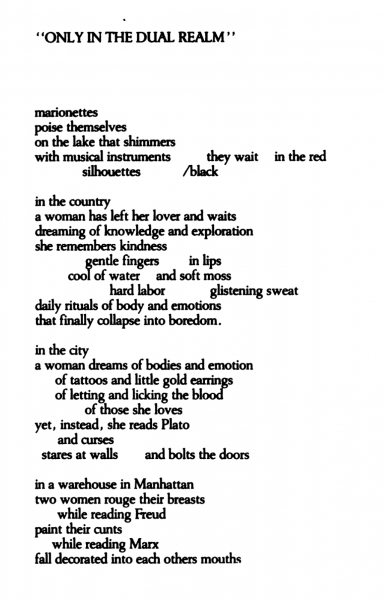
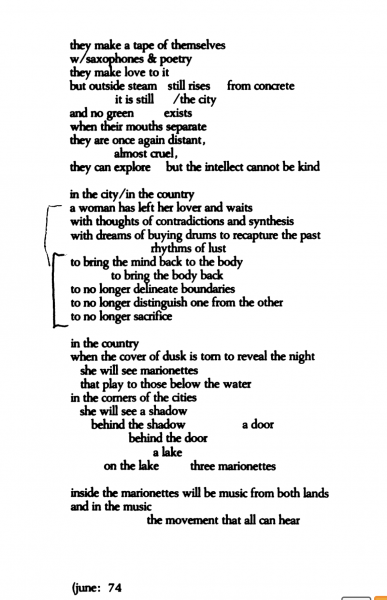
This poem orignally appeared in the Boston area anarchist journal Black Rose #2 (Spring 1975), in a slighty different form. Dickenson also has two poems in the first issue. The bio note in the first issue reads: "George Dickenson has just quit her last job after spending two days adding carcasses at a meat packing plant and is struggling to live her life as a lumpen. From the Catholic Church to a fascination with Ayn Rand and through a brief stint with left liberal politics in California in the sixties George arrived at anarchism and later lesbian feminism. After moving to Vermont for a little R&R from Berkeley she learned to drink beer and became a member of a women's theater and of a number of lesbian/feminist/anarchist action and discussion groups. She has recently moved to Boston."
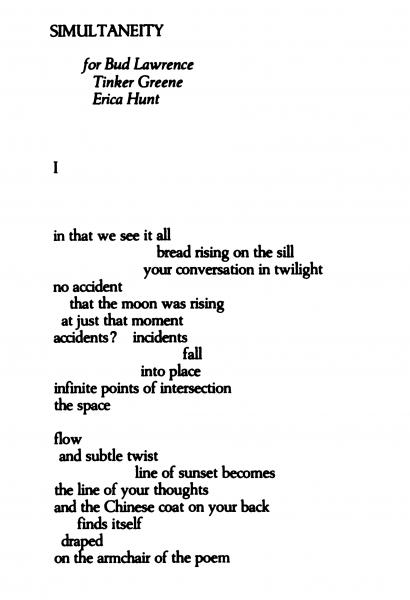
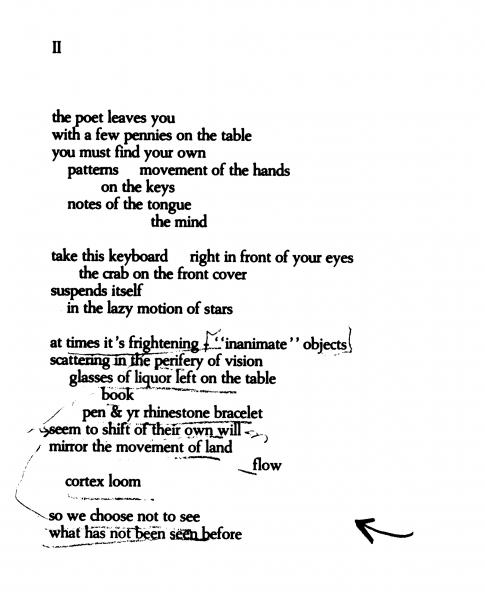
first two of seven sections from 1975/1976
1977 review of Striations in Gay Community News (Boston), plus interview: 1 and 2.
